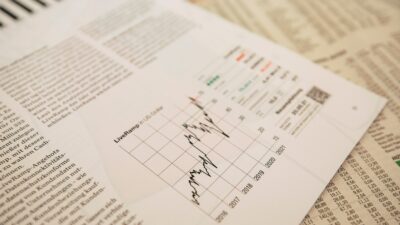Sandra Peter, Kai Riemer and John Buchanan

The great resignation on The Future, This Week
This week: with so much talk of the great resignation, the great realignment, job swap and early retirement, what is actually going on and what do we need to know about it?
Sandra Peter (Sydney Business Insights) and Kai Riemer (Digital Futures Research Group) meet once a week to put their own spin on news that is impacting the future of business in The Future, This Week.
The stories this week
05:02 – what’s up with the great resignation?
Other stories we bring up
Our recent webinar with Professor Daniel Kahneman
Our previous podcast with Professor Kahneman
You can make money by pooping on this toilet
The lack of fish poop is adding to climate change
Mr Goxx, the cryptocurrency trading hamster
Fewer skilled immigrants and foreign students effects on labour markets in Australia
Texas A&M University’s Anthony Klotz coins “the great resignation”
Paul Krugman in the New York Times on the great resignation and the great rethink
Nurses exit the profession in “droves”
Why there hasn’t been a mass exodus of teachers in the US
What we’re getting wrong about the Great Resignation
Data shows employee turnover has been rising steadily for the past decade
Labour force market data from the Australian Bureau of Statistics
Follow the show on Apple Podcasts, Spotify, Overcast, Google Podcasts, Pocket Casts or wherever you get your podcasts. You can follow Sydney Business Insights on Flipboard, LinkedIn, Twitter and WeChat to keep updated with our latest insights.
Send us your news ideas to sbi@sydney.edu.au.
Music by Cinephonix.
Dr Sandra Peter is the Director of Sydney Executive Plus and Associate Professor at the University of Sydney Business School. Her research and practice focuses on engaging with the future in productive ways, and the impact of emerging technologies on business and society.
Kai Riemer is Professor of Information Technology and Organisation, and Director of Sydney Executive Plus at the University of Sydney Business School. Kai's research interest is in Disruptive Technologies, Enterprise Social Media, Virtual Work, Collaborative Technologies and the Philosophy of Technology.
John is the Co-Director of the Mental Wealth Initiative and a Professor in the Business Information Systems Discipline at the University of Sydney Business School. John is an expert in labour market structuring and its implications for skills and education. Current research interests include the future of expertise and social solidarity in a world of mass underemployment and AI.
Share
We believe in open and honest access to knowledge. We use a Creative Commons Attribution NoDerivatives licence for our articles and podcasts, so you can republish them for free, online or in print.
Transcript
Disclaimer We'd like to advise that the following program may contain real news, occasional philosophy and ideas that may offend some listeners.
Sandra What should we talk about today?
Kai Well, we could talk about the fact that you did an interview with Danny Kahneman, Nobel Prize winner in economics this week. Is that actually coming on as a podcast or a recording?
Sandra Or both, it was a really, really good chat. So we'll make sure we share this, both in this channel and on Sydney Business Insights, for those of you who haven't participated, but many of our listeners were there.
Kai And for you a twice in a lifetime opportunity because we can also, of course, put the link to the previous conversation you had with Danny Kahneman in the shownotes, where you talked around Thinking, Fast and Slow and some of the topics that didn't make the cut for this instalment.
Sandra True, but it's twice in a lifetime so far, hopefully, we'll be sure to have him back. He's been absolutely amazing, and probably one of the most important intellectuals with the greatest impact on so many fields coming out of psychology, but having a broad impact in many, many disciplines. So what else should we talk about?
Kai If we can't find anything else, it is world's Toilet Day once again, we mentioned this every year.
Sandra Yeah, there's been toilet stories. I think there was one in Gizmodo that said let's not forget you can make money by pooping in this toilet.
Kai Yes, there are researchers in South Korea at Ulsan National Institute of Science and Technology. We have developed a sustainable toilet contraction called BeeVi that basically turns human waste into gas energy that is and manual. And that rewards the user.
Sandra Yeah, toilet cryptocurrency, so you will be paid in cryptocurrency.
Kai It's not called PoopCoin, as the article points out, but Ggool. And it is not publicly traded, so those of you who thought you could jump on the next crypto bandwagon here, it is only used on the University's campus.
Sandra But you could buy fresh produce and snacks and drinks on campus. And, you know, in the same craze that we've seen around cryptocurrencies and NFTs this year, remember Mr Goxx, the hamster that was trading cryptocurrencies with that rigged cage, where it would walk over a certain area and there would be an automatic trade made and Mr Goxx has so far beaten the S&P 500 and Berkshire Hathaway and Bitcoin itself with its, you know, hamster investments.
Kai Yeah, but in this instance, a true invention for the circular economy, where you can, you know, buy foods with the money you earn from your waste.
Sandra Speaking of sustainability and poop, there has been some bad news around fish poo, declining fish poo changing the ocean carbon balance.
Kai This is related to the overfishing of the oceans, researchers have found out that fish actually are a carbon sink, they take carbon out of circulation, and when they produce their own waste, the carbon sinks to the ocean floor where it is captured. And with less fish in the oceans, less fish poop and therefore less carbon capture.
Sandra And you'd think fish poop wouldn't be such a big issue but turns out a shortage of fish faeces is contributing to shifts in the oceans carbon cycle of an equivalent magnitude to the impact of climate change on the ocean. It seems that before industrial fishing developed, the fish poo accounted for about 10% of the biological material sinking to the ocean floor. But by 1990 that declined by almost 50%, and that biomass continues to fall. So very serious.
Kai Yeah, but the topic we're going to talk about today is equally cheerfully termed 'the great resignation'.
Sandra The phenomenon dubbed the great resignation has been pretty much constantly in the news for the past couple of months. What is it? Is it really happening? What should we know about it? We need to talk about this.
Kai Well, let's do this.
Sandra Let's do this.
Intro From The University of Sydney Business School, this is Sydney Business Insights, an initiative that explores the future of business. And you're listening to The Future, This Week where Sandra Peter and Kai Riemer sit down every week to rethink and unlearn trends in technology and business. They discuss the news of the week, question the obvious and explore the weird and the wonderful.
Kai So Sandra, what is the great resignation?
Sandra The great resignation is a term coined by Anthony Klotz, who's at Texas A&M University, who a few months back, observed that the number of people quitting their jobs in the US seems to be on a very sharp rise, and termed this 'the great resignation'. He saw that basically the number of people quitting because of supposed burnout or rethinking of work/life balance and so on, seems to be increasing. And the term caught on like wildfire. There were Nobel Prize winning economists writing in The New York Times about this.
Kai This was Paul Krugman.
Sandra Yep, dozens and dozens of thought pieces and articles started to analyse why people might be doing this, whether it was seeking a better work life balance in the wake of the pandemic, whether it was changing priorities in what people wanted, or were able to work on, whether it was people retiring early in life, or having life epiphanies about what they wanted to do with their lives. But it seems pretty much a given that there is a great resignation, and that this is a phenomenon that we will just have to get used to, not only in the US but everywhere else in the world.
Kai And it is an inspiring story. Because from the individual perspective, it's this narrative that there's new opportunities, people are taking matters into their own hand. There's these anecdotes and cases being reported in the media of people rethinking their lives and making the best of the pandemic and changing careers or finding employers in different parts of the world now that people can work remotely. And it also makes for great business opportunities for a whole range of consultancies and professional service firms. Because employers are obviously anxious because churn and turnover in staff is not only disruptive, but also very costly because jobs go unfilled and hiring costs a lot of money. So there is now an emerging industry around the great resignation as a topic.
Sandra And it's not only these dozens of articles that we've been seeing, but it seems to crop up in conversations were having almost every day, people fearing the great resignations, people thinking about it, data coming out of various organisations seems to be pointing in that direction. The original numbers were the US numbers where it was, I think, about 2.9% of the American workforce back in August had left their jobs, but also the number of open jobs in the in the UK seem to be at record numbers. And in Australia, the conversation revolved around the effects, not only of COVID-19, but of fewer skilled migrants, fewer students being in the country, and people rethinking their work life balance, and there were cause. And the more we read about this, the more confusing things seem to get.
Kai Because there's at the same time reports that around 7% of employees in the accommodations and food services have left, that is hotel clerks and restaurant servers and bartenders and that it is very hard to fill jobs in these industries, and restaurants can't operate at full capacity. Flight attendants have been laid off or have quit. And flights have been cancelled en masse in the US because airlines find it hard to find enough personnel to staff flights, when at the same time, we've seen reports that say teachers, who have arguably had one of the most stressful jobs during the pandemic, are not quitting in significant numbers, are sticking to their job. So it seems that the phenomenon is a little bit more complex than the one liner, 'the great resignation is here', would suggest.
Sandra And indeed, there's a couple of things to note there. And the first one is that people in the US have already started to point out that maybe it's worth looking at pre-pandemic trends. And whilst there are some pre-pandemic trends that might point to a great resignation, looking at employment numbers and how they've changed over time will show in the US that employee turnover has been steadily rising for about a decade in the US. And it just might be the new normal, the new trend and whilst there was a sharp drop during the initial phases of the pandemic, where people might not be really willing to change their job, while things are in lockdown, and while there's a lot of uncertainty. After the pandemic, that trend just picked up from where it was going anyway over the last 10 years. And the fact that this is happening in the US doesn't necessarily mean that it's happening in the same way or for the same reasons in in other parts of the world. And in Australia, we've already started to see people questioning whether or not there is real evidence of that great resignation.
Kai And Mark Wooden and Peter Gahan from the University of Melbourne wrote a piece in The Conversation which says that Australia's great resignation is a myth, that in Australia the trend is actually going the other way long term that people are switching jobs much less than in the previous decades. And that that actually might not be such a good thing because a workforce that is more mobile also is more innovative, more creative, for example.
Sandra But also in Australia, we've heard numerous calls from professional service firms that cannot keep their staff or cannot hire enough staff. We've heard in the health care sector that there are, you know, up to 50,000 jobs that are not being filled. So there seems to be a very unclear picture as to what exactly is this great resignation. And is it actually happening?
Kai But we do have someone in the school who's actually taken a closer look at this phenomenon in recent weeks.
Sandra Professor John Buchanan.
Kai Professor John Buchanan, yes. And John has been looking at this for the past few weeks to try and unpack what is actually going on in Australia with the great resignation, where does it actually happen, what are the numbers in the different industries? And John is a Professor here at the Business School. He is Co-Director of the Mental Wealth Initiative of the University, he used to be the Director of the Workplace Research Centre. And he is really on top of all things labour market with a focus on the education and health sectors.
Sandra We should call John.
Kai Let's call John, yes.
AUDIO PHONE RINGS
John Buchanan Hi.
Sandra Hi, John.
John Buchanan How're you going Sandra?
Sandra Thanks for dialling in. We need a bit of help trying to unpack this great resignation across sectors because there seem to be these conflicting stories coming from different parts of the economy. And you've had a closer look at this over the last few weeks. So help us out here.
John Buchanan Look, we're very lucky in Australia, the Bureau of Statistics has a reputation as being one of the best statistical agencies in the world. And in recent years, they've even excelled themselves. And the vacancy data they now provide is amongst the best they've ever put out. And when you look at it, people are right to say there has been a huge surge in vacancies. So you know, we've heard about the 30 years of uninterrupted growth from the early 90s. through to the downturn, Australia survived the GFC relatively well. And just prior to the GFC, we had about a quarter of a million vacancies every month. Well, that's now up to or over, it got to a peak up over 350,000 a month. That's a lot of extra vacancies. So this is in the recovery phase, obviously. Those vacancies are of different character in different parts of the economy. So what I did is I said, 'let's look at the latest bunch of vacancies'. We're talking about 373,000 for August 2021. And a half those vacancies come from four industries: health, admin services, retail, and professional services. So if you understand what's going on in those four, you get an understanding of the flywheel of labour demand at the moment. And the single biggest industry of vacancies is health. But when you look at the overall numbers, employment there hasn't been growing very strongly. So whilst there were 51,000 vacancies in health in August, over the last few months, jobs have virtually stagnated. In fact, last from March to June, they're 27,000 jobs. So that's telling you there's a lot of churn.
Kai So we can then assume that in health, there is indeed that great resignation happening, that nurses are increasingly burned out and stressed, and having been working at capacity during the pandemic, they are quitting. And so the vacancies that we see are not due to growth in the industry, but actually people leaving.
John Buchanan Absolutely, and see normally health has a pretty stable vacancy rate, at any one time over the last 10 years the vacancy rates been about one to one and a half percent of all jobs. In the June quarter it was 3.3%. So there's a really big jump going on there.
Kai There's an article just out in the Sydney Morning Herald which speaks to that, right. Which says that around 25,000 critical care nurses have quit, and while there's roughly that number of graduates coming into the system, that is not enough to replenish and obviously junior nurses need a lot of onboarding, a lot of help to find a way that can make up for experienced nurses quitting the system, and it does not do anything about the vacancy rate that was already there.
John Buchanan Absolutely and look, this is long-standing. I mean, people talk about a skills shortage with nurses, Australia has no shortage of nurses but there is many people qualified as nurses not working in the profession as there are actually working. So there's a problem with the jobs. What there's a shortage of is decent work. Look, I think nurses are fantastic and they do a great job and the nurse unions have done a great job in improving their conditions, but they are a female-dominated profession, they've been getting better, but they've still got some way to go to get paid what they're properly worth. And they've been operating in a public health system, which has been underfunded. We've got a world class health system, don't get me wrong, but treasuries around Australia have been screwing down on health budgets and that felt most acutely at the frontline, with nurse professionals.
Sandra And then COVID-19, adding prolonged stress and burnout over the last couple of years. People are choosing either to quit, or many well-trained nurses choosing to retire early, given no end in sight to the crisis.
John Buchanan Yeah, there is another inflection to the story, I did talk to somebody from the private health sector, because you know, you got to remember in Australia, while 70% of the funding comes from the public sector, around 70% of the expenditure goes out through the private sector. And he was saying that he he'd seen in some areas that the vacancies were also reflecting a shift from casual to permanent work. So in response to this churn, a number of employers are saying, 'We've got to upgrade the job'. So there could be a bit of silver lining on that cloud, I'd like to see the numbers. But once again, if that's happening, that's in response to labour supply pressure in the context of these insurgent vacancies.
Sandra But you said four different sectors, right, you spoke about health care.
John Buchanan Yep. So the classic sectors where you would think there's a correlation between an increase in jobs and an increase in vacancies, that's definitely coming through in retail and admin services. So if you look at retail, for example, from March to June, this year, there was an increase of 85,000 jobs, you know, that's a bucket load of jobs. And so it's unsurprising that they had 33,000 vacancies. So that's your classic story, labour demand goes up, advertisements for vacant jobs go up.
Kai So that is jobs coming back after lockdown after the pandemic, not having been filled yet. And the same is probably true in some of the
AUDIO DOG BARKS
Sandra Are you being attacked there, John?
John Buchanan That's right.
Kai The same is probably true in hospitality, right, with restaurants scrambling to find waiting staff to staff their hours and opening at full capacity.
John Buchanan Yeah, absolutely. Look, I know the JobKeeper Program is much maligned, and there were very bad design faults in it. But the underlying idea of keeping people in touch with their employers at the height of the crisis was a good one, because what's known as specific human capital is important. Knowing how a particular employer functions, you know, having an understanding of their working arrangements is important. And I think that has helped keep the pressure off those sectors. So they're coming back, but they're able to crank people's hours up, they're not having to advertise for whole new vacancies.
Sandra Two more sectors that you mentioned there.
John Buchanan So admin services went up by 42,000 jobs, and it had 36,000 advertisements. That's the kind of classic case that you'd expect. The more interesting one is professional services. And there's a lot of squealing going on coming out of this sector, particularly in the consultancies, they're saying they can't get the labour they need. They advertised 31,000 vacancies, but their overall employment only went up 1.3%. So that once again, is a bit like the health story, there's an issue about churn as opposed to a surge in labour demand.
Kai Although I do think that in that industry, what we're seeing is different to health in the aggregate data, right. Individual employers, they experience a form of the great resignation, people might be leaving, but they're switching jobs, right. We've seen data from LinkedIn, which said that in October, job movers went up by 26% year on year from last October, and LinkedIn gears towards you know, professional service and white-collar work, which might just be two things. One is, people realise that they have options, and they might actually pick employers based on you know, whether they want to go back to the office or stay remote. So they're just readjusting their expectations and find the right employers. But also there has been a surge in digital services, for example, right. With the pandemic, everyone moving digital, there is much more need in digital consulting services. And with companies coming out of the pandemic, there's also likely an increase in, in need for, or demand for consulting professional services to basically realign business models, drive digital transformation project, and in general adjust to the new world of hybrid.
John Buchanan Sure, but that's probably more a realignment of the workforce as opposed to an absolute increase in the labour demand in the sector. So that from March 2020, through to June 2021, there's been around 1.3 million people in the sector. So the absolute number of jobs has remained the same. Your point would hold if there's been a change in the composition of the work that's required. So that, you know, if you've got that shift in interesting hybrid work, then you might need more people who are conversant with IT and the like. Once again, you got to keep these people in perspective, they had a high vacancy rate in 2018, you know, way before the pandemic, they had 2.4% vacancies then, before COVID. The current vacancy rate there is just the same as that. So I think health is the more serious problem, there is actually a significant shift in the amount of churn going on there, and if I was going to single out a sector that needs special attention, I'd be thinking about health.
Sandra It's also likely that in things like professional services, a lot of the people who are changing jobs have really kind of generalizable skills, right, all those competencies, whether they're around communication, or IT, they're very easily transportable across companies quite often across industries as well. And a lot of those professions are very easy to switch jobs with, whereas that's not the case in other industries.
John Buchanan Yeah. And while there is some data on what's going on in the information media and telco sector, and there's not a huge surge in demand going on there. But that is the more specialised area, that is the more technical area, your point about provisional services is true, they are more generic and what would be called more soft-skills area. So yeah, there is an ease of transferability there, that's not the case in health, you know, to operate in health you've got to be trained as a nurse. And even if you're in a nursing home these days, usually they have a Cert III in Aged Care.
Sandra And maybe let's have a look at one more, which is education, because the stories coming out of education seem to give very conflicting messages. Like out of the US, we've seen a lot of stories that say, you know, K through 12 educators have not taken part in the great resignation, people have stayed put in their jobs. And that was quite surprising, because it's been one of the jobs under most stress, it's also a female-dominated industry. So people were expecting this to be swept up in the great resignation. It wasn't. But then in Australia, we're also seeing a lot of news around people quitting the higher education system. So, so what's going on in education?
John Buchanan Yeah, it's a sector pretty close to my heart because I look at the relationship between education and economy, and the post-school area is in crisis in Australia, there's no other word for it. So looking at this data on vacancies, so this isn't the number of people in work, this is the actual number of jobs employers have provided, compared to March 2020, they're down about 75,000. That's a drop of, you know, just under seven or 8%.
Kai So in education, really, it's not the great resignation, but the great job loss, right?
John Buchanan Yes.
Kai Education providers, just basically having to adjust to, you know, international student numbers dropping during the lockdown during the travel ban in Australia, and therefore, jobs actually lost. So the opposite effect to what we see in some of the other industries.
John Buchanan Look, I think calling it job losses is too neutral, Kai. I think there's been a deliberate policy neglect. Millions, hundreds of millions of dollars have been poured into the airlines, the government is more concerned about having a travel industry than it is about having a strong post-school education sector. And I think, when you look at the impact of crises on labour markets, the decisions that are made at the height of the crisis tend to shape the nature of the trajectory afterwards. And so, you know if you're looking at the future, I'd be worried about this. Because it's easy to retrench people, it's a lot harder to get them back in.
Kai So what you're referring to is the fact that much of the education sector wasn't included in JobKeeper.
John Buchanan Absolutely.
Kai Where universities did not have the same access to, to federal funding to keep people, you know, close to their jobs, but had to just shed people and now we're in a situation that these people might be moving on to other industries.
John Buchanan Absolutely. And that's pretty much an Australian thing. A lot of European countries, the Canadians, they put a lot of money into education, because those countries made the rather sensible decision that if there's going to be a whole lot of unemployed people around, we should be doing something with that idle time. And you know, giving them a better education is better than just having them sitting around, you know, on income support. So I think this is something that's going to be a story for years to come.
Sandra So if we're looking forward at years to come, we're having a chat about the great resignation and where this 'so what?' moment. So what do we do about this? How do we deal better with the significant changes underway in the labour market in Australia, and in general?
John Buchanan My areas of deepest specialty are in the business of health and the systems of workforce development. And they are for me, the two industries which are out of this data the most interesting anyway, you know, just from a labour market point of view, but I actually do know quite a bit about those sectors. And with health, we've really got to think about how we make that work more attractive and more sustainable. And nurses’ unions in Australia have led the way there and getting appropriate staffing ratios, but they clearly have to continue down that path. And it's not just labour conditions, it's also getting onto a preventative agenda, so we keep people out of the health system. So I think that'll be a thing to watch, and there's growing interest, you know, even employers recognise that can't keep on doing what they've always done. On the education side, I think that we need to recognise that the underlying business model around higher education in Australia is no longer sustainable. So looking forward, I think what we do with the future of post-school education is a very open question. And clearly the past is not a good predictor for the future, we've got to actually think quite differently about what are the design principles that can get a quality sustainable system in place.
Kai And that's a really good point that applies across the board, right? The past post-pandemic is no longer a good predictor for the future. Thanks so much, John, I just note that the construction industry seems to be doing well, judging by the background noise in your place. And also what we see around town here in Sydney, construction is certainly booming in Australia. Thanks, John, so much. This was a great help for us to make sense of what's going on out there, trying to unpack the great resignation, the great job migration, the great job alignment, and to see that it is actually quite different in different sectors. Thanks, John.
John Buchanan No worries. Thanks for having me.
Sandra Thanks so John.
John Buchanan See you Sandra, see you, Kai.
Sandra So this chat we've been having today really drives home one big point for me, which is the need to have better conversations, we seem to come up with these really simplistic, simple explanations, 'oh, the great resignation' that then is a phenomenon and applies everywhere and in all situations. Yes, there is a big challenge on the way. But once we've lifted the hood, the great resignation seems to be actually a whole number of different things in different industries.
Kai And there's two things to that. One is the, the general tendency we have these days that you know, while we recognise we live in an increasingly uncertain and complex world, we basically resigned to these three-word answers. So the narratives become very simplistic - 'the great resignation'. But there's also an issue with how we work with aggregate data, then, you know, we see overall, yes, there might be a great resignation. But when we drill down, as John has shown us, we realise they can be very different phenomena in different industries. And we need to take account of those local differences, even between the US and Australia. But then in Australia, between those different sectors that John talked about.
Sandra Exactly. And this constant tendency in the media and, you know, on our other platforms, whether it's Facebook, or TikTok, or even LinkedIn, to simplify really complex issues into these sound bites actually makes it a lot more difficult to deal with the real issues. So exposing the complexity is probably one of the best things we can do about the great resignation.
Kai Yeah, and we're not saying that everything needs to be complicated, but we need to resist oversimplifications of complex matters. And what John has shown us is that there's really a difference between a genuine resignation in some jobs, like the healthcare sectors where people are quitting the labour force, they're dropping out of the market altogether, creating real issues in that sector. And then in other industries, like professional services, where it's rather a great job migration, where people realise that they have new options because they can now work remotely, which means they have access to a whole range of employers that geographically might not have been accessible. And they're also picking now, on the basis not just of their skill set, but the way in which employers let them work. So I might want to work for an employer that gets everyone back to the office because I prefer that, vis-à-vis, others who wants to work remotely.
Sandra And at the end of the day in these industries, it might just be that companies simply need to plan for a new world where this greater mobility just exists. And it is a fact of life and people do find it easier to change jobs and get new employment.
Kai And as we said, when you're working from home, it might literally just be, you know, handing one laptop to the FedEx guy and receiving another laptop in the mail. You know, opening a different laptop the next morning and you're working for you know, someone else.
Sandra But we're staying put, and I think this is all we have time for today.
Kai That's what we wanted to do today. Yes, thank you.
Sandra Thanks for listening and Happy World Toilet Day.
Kai Thanks for listening.
Outro This was The Future, This Week, an initiative of The University of Sydney Business School. Sandra Peter is the Director of Sydney Business Insights and Kai Riemer is Professor of Information Technology and Organisation. Connect with us on LinkedIn, Twitter and Flipboard and subscribe, like or leave us a rating wherever you get your podcasts. If you have any weird and wonderful topics for us to discuss, send them to sbi@sydney.edu.au.
Sandra And you'd think fish poop wouldn't be such a big issue but turns out, a shortage of fish, feesh, fish, fish, feesshies.
Kai Fish faeshes! Can you say it again?
Sandra A shortage of fish faecshes. A shortage of…
Kai The answer's no.
Sandra No.
Close transcript







